
MBA education has long been regarded as a gateway to leadership roles in the business world, shaping individuals into strategic thinkers and decision-makers. In the dynamic landscape of business education, Aditya Singh, the Director of the Athena School of Management in Mumbai, India, stands out as a distinctive academic leader with a wealth of experience spanning the corporate sector, consulting, entrepreneurship, and academia.
Aditya’s nearly two decades of diverse experience are underscored by his affiliations as a Fellow of the Royal Society of Arts in London, a member of Chatham House, The Royal Institute of International Affairs, and active participation in the OECD Forum Network. These affiliations not only speak to his global awareness but also reflect his commitment to driving change on an international scale.
In this exclusive interview, Aditya Singh shares valuable insights into the evolving landscape of MBA education and its intersection with the broader business world. We explore the pivotal role MBA programmes play in shaping the leaders of tomorrow and delve into the challenges and opportunities presented by global issues such as sustainability and innovation. Join us as Aditya takes us on a journey through the transformative potential of education, highlighting the intricate dance between academia, entrepreneurship, and sustainable development in the ever-evolving business landscape.
Access full interview only on PaGaLGuY YouTube Channel – Subscribe Now
Q1. With over a decade in education and business, including roles with TATAs, IBM and AACSB Small Schools Network, and as the Director of Athena School of Management, what inspired your move into academia?
Ans: That’s an interesting question, Like many others, I embarked on this path, starting with my first MBA at SPJIMR in Mumbai before venturing into the corporate consulting sector. Everything was going smoothly until around 2011, when I observed a significant shift.
Before 2008, securing a good job after an MBA was relatively straightforward. However, by 2011, something intriguing had unfolded. Engaged in talent consulting and deep strategic research, my team and I noticed a striking change. Out of every 100 MBA students interviewed by top companies, a staggering 95% faced rejection in their initial interviews. This statistic raised concerns, especially when compared to the scenario just four years earlier.
The root cause of this high rejection rate became apparent: these students possessed solid theoretical knowledge but needed to gain the practical skills and qualities that corporations sought in entry-level employees. Faced with this realisation, I found myself at a crossroads: either discuss the issue or take action. I chose the latter. Looking back, it was the right decision, although I didn’t fully grasp it then.
Motivated to bridge this gap, I embarked on the journey to establish a business school. The experience has been remarkable. As a young and independent institution, we are determined not to be tied to any particular agenda. Our mission is clear: to follow our beliefs and focus on backward integration. Our goal is to align what the corporate world needs with what we provide in our curriculum.
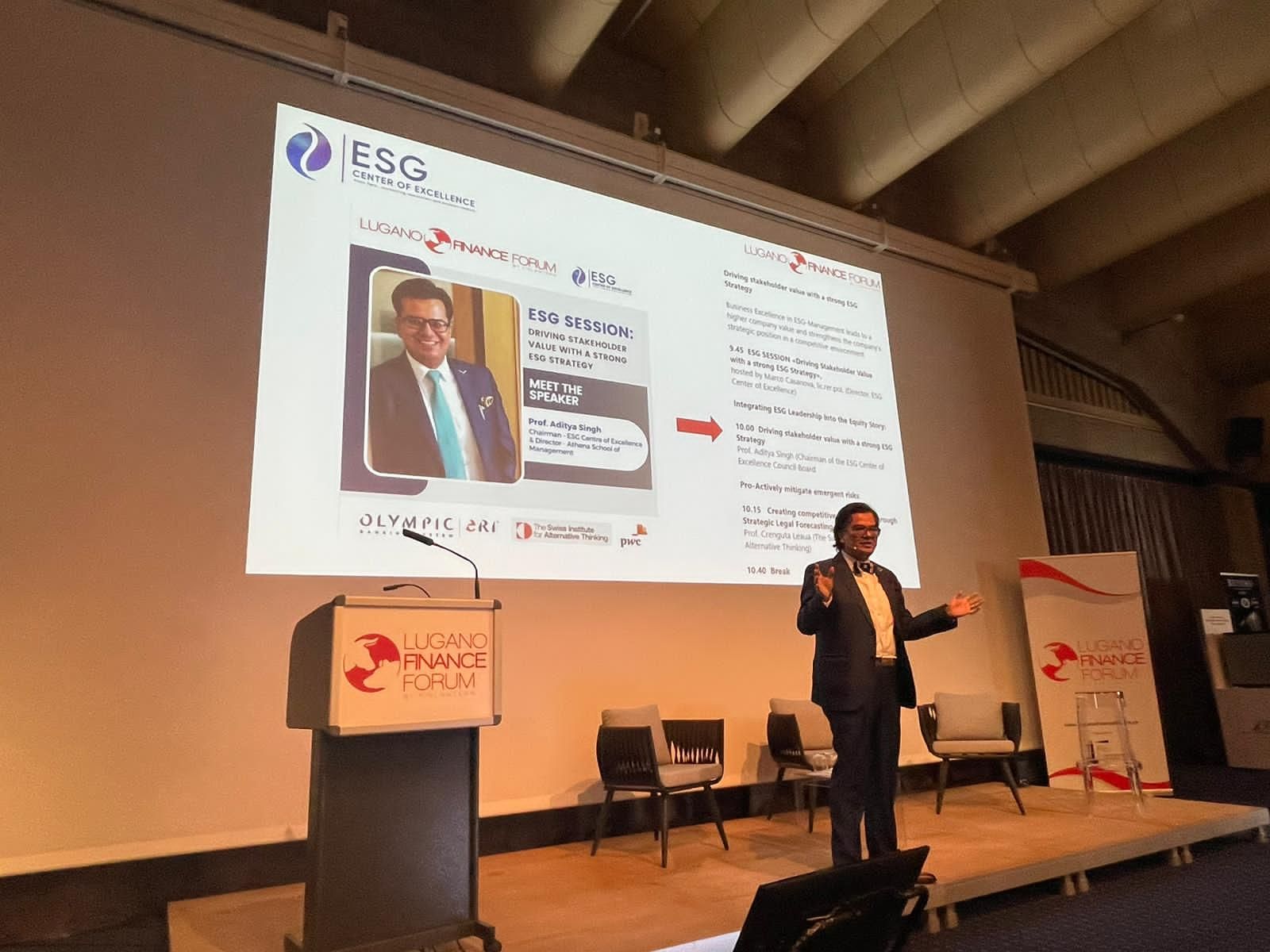
2Q. There are intriguing facets to explore about establishing a business school. At what juncture did you engage with this initiative, and what led you to align with Athena’s vision?
Ans: I have some breaking news to share, something I don’t usually do: I was, in fact, a member of the founding team at Athena! The journey started when a group of us from a consulting background decided to venture into creating something innovative and extraordinary. Athena, while shaped with me as the face of the institute, is truly the product of the collective efforts of many dedicated thinkers, myself included.
I started Athena when I was 29. Being a founding team member dedicated to forging a better future for young minds was a remarkably captivating journey. Over the past 11 years, I’ve observed substantial growth within the institute, paralleled by my personal and professional development. Looking back on this journey, I express immense gratitude for the experiences and opportunities it has afforded me.
3Q. Educational institution founders in India often have compelling narratives of their experiences. Could you share some of your stories about the challenges you encountered in founding an institution and the strategies you employed to overcome them?
Ans: One of the foremost hurdles we confronted during the inception of Athena was establishing trust. As a 29-year-old director of a fledgling institution, gaining credibility was a challenge, particularly given the strong emphasis on seniority in India. People hesitated to believe in us, questioning whether we could fulfil our commitments or if we would vanish after a few years. I would like to give credit to our first few batches as it was their confidence in us that led us here today – Athena has not only thrived but has also become one of the most esteemed educational institutions in India.
Managing resources presented another significant challenge. Educational institutions demand substantial resources; competing with corporate entities entering the sector can be daunting. Nonetheless, our stance has always been clear – we refuse to conform to others’ rules. Choosing to tread our own path, we’ve built our successes on our terms. We firmly believe that what we offer is distinct, unique, and even revolutionary. Embracing our differences, we fearlessly challenge the status quo.
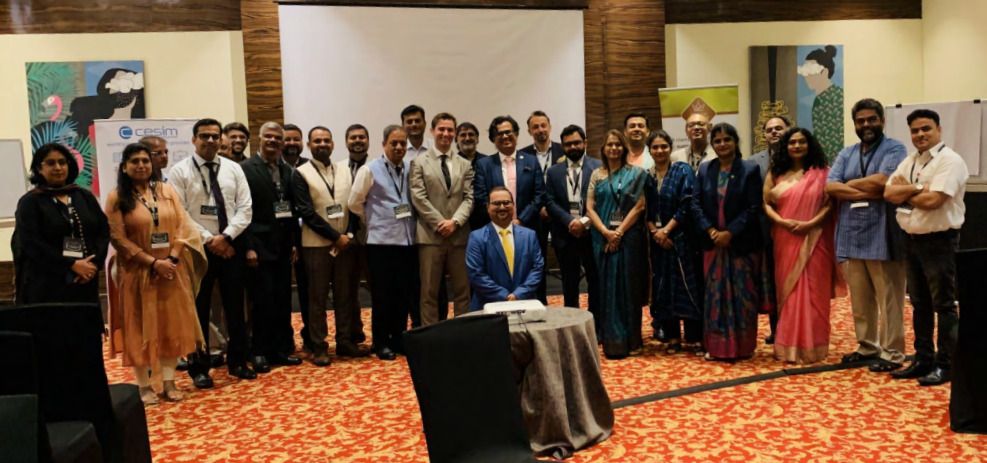
4Q. Reflecting on your unique qualities and the strengths you’ve built over the past ten years, what stands out to you?
Ans: Athena’s uniqueness lies in three core components:
1. Practical Learning: I firmly believe that business education transcends textbooks. At Athena, we prioritise hands-on experience through multiple internships offered each semester. Our students, by the time they complete the programme, accumulate 6-7 months of real-world exposure, fostering valuable skills and significantly increasing their chances of securing Pre-Placement offers (PPOs).
2. Global Perspective: In today’s interconnected world, international exposure is paramount. Our students have the opportunity to embark on extended international internships in various countries, engage in exchanges with partner universities globally, and broaden their horizons. We take pride in the diverse exposure our students receive, with experiences in countries such as the Netherlands, Turkey, Portugal, France, Germany, and Cairo. Additionally, our second-year students can participate in international exchange programmes at renowned universities like McGill University in Canada or Nanyang Technology University in Singapore, enhancing not only their academic knowledge but also providing exposure and experiences.
3. Experienced Faculty: Our faculty comprises academics with doctorates and industry experts with extensive real-world experience. This unique blend ensures a comprehensive education that directly applies to the dynamic business environment.
Moreover, we prioritise the development of soft skills, effective communication, grooming, and presentation capabilities. As an Athena student, you will have the opportunity to engage with prominent figures, such as the president of IRDA or RBI, while also participating in adventurous sports and various activities. This emphasis ensures that our students can confidently interact with industry leaders and thrive in real-world situations.
Q5. How do you navigate the delicate balance between breadth and depth in your business school curriculum? Some institutions emphasise specialisation, focusing on depth in specific areas, while others adopt a more all-encompassing educational approach. Could you elaborate on your strategy in managing this dynamic?
Ans: To tackle our debt challenges, we’ve adopted a straightforward strategy: limiting our student intake. Despite the considerable difficulty of managing thousands of students with each intake, we maintain small class sizes, typically ranging from 25 to 30 students. This approach ensures a personalised and customised educational journey, fostering individuality and non-conformity. At Athena, we are dedicated to helping students enhance their strengths and address their weaknesses.
Athena places a strong emphasis on interaction and exposure. We take pride in being pioneers in Collaborative Online International Learning (COIL), enabling our students to participate in joint projects with peers from top business schools globally. This diverse exposure is invaluable for their personal and professional development.
In terms of technology and innovation, these advancements are tools to enhance digital cognition. Our goal is to equip our students to adapt to change and contribute to its creation. While we don’t aim to make them technical specialists, we emphasise the importance of understanding how to effectively utilise these tools.
Our vision involves tapping into a network of institutions, research bodies, and industry practitioners, providing real-time exposure and knowledge to our students. This approach ensures that they stay ahead in a dynamic and evolving world.
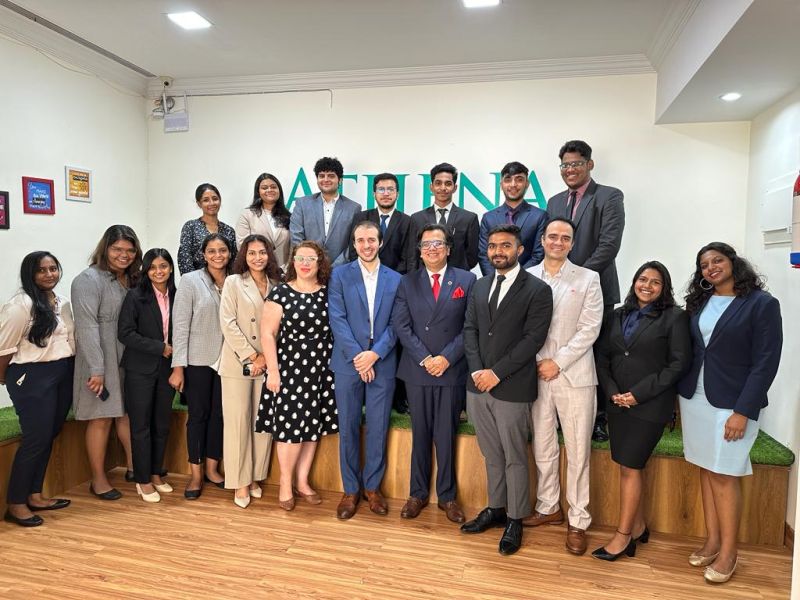
6Q. How do you view the integration of innovation and technology within the MBA curriculum and the broader landscape of business education?
Ans: This question is intriguing to me, as I also teach across business schools globally, such as FDC in Brazil. The focus of my teaching revolves around digital transformation, particularly in collaboration with them. I consistently convey to my students that technologies like AI, ML, or blockchain are not disruptors; instead, they serve as tools or allies in advancing one’s digital cognition. In the current era of Generation Z, it’s evident that this is the last generation where digital skills are not innate. The next generation will naturally be well-versed in digital technology.
Therefore, it is crucial for today’s generation to leverage technology to enhance themselves, as it significantly contributes to career advancement, encourages thinking on a larger scale, and promotes innovative perspectives. Resistance has always been a part of the process, whether it was the introduction of calculators in the 1960s or the disruption caused by CHATGPT today.
It’s essential to recognise that we are no longer just training managers; we are shaping leaders. As a leader, it is imperative to adeptly use tools to think differently and approach tasks with a unique perspective. I refrain from labelling it as mere evaluation or revaluation; I view it as a continuous process of re-evaluating business education.
7Q. You highlighted your school’s mission to cultivate leaders. How do recruiters typically react to this emphasis? How do they interact with your institution, and what specific qualities are they seeking when recruiting from your school?
Ans: We recognise the importance of strong connections between campus and corporates from day one. Our approach is characterised by:
- Multiple Internships: We prioritise multiple internships for students.
- Real-Life Projects: Companies collaborate with us on real-live projects.
- Senior Executive Interaction: We facilitate regular interactions between students and senior corporate executives.
From the outset, we consult with companies to ensure a strong fit between their needs and our students’ skills and attitudes. Unlike other institutions, we focus on quality over quantity in placement matches.
Some students choose to start their own businesses, reflecting the entrepreneurial spirit we nurture. While not all succeed, the learning journey remains a valuable aspect of our approach.
It’s notable that while many students initially aspire to become entrepreneurs, they may discover the challenges and financial constraints involved as they progress. Our aim is to equip them with the knowledge and experience to make informed decisions about their future paths.
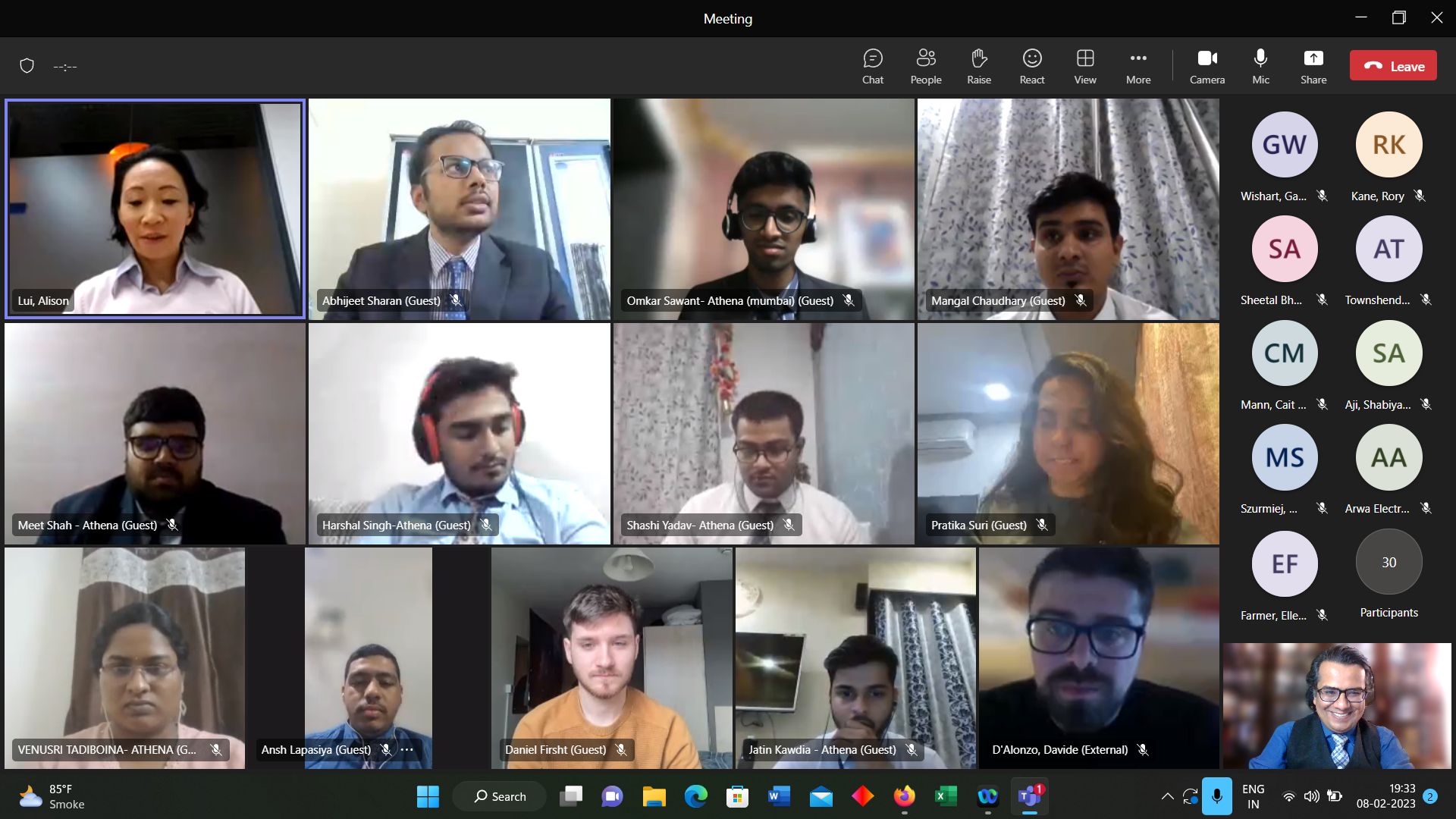
Q8. Each school possesses unique strengths that are not always apparent to all. Can you highlight some of the distinct advantages or hidden gems that Athena has which may not be widely known among students?
Ans: The personalised touch at Athena is deeply meaningful to me. Our community operates like a tight-knit family, and I feel fortunate to be a part of it. Elements such as sharing experiences, looking out for one another, and having easily accessible faculty are fundamental to our close-knit environment. We prioritise providing unwavering support, just a phone call or WhatsApp message away, recognising the essential need for immediate assistance in today’s fast-paced world. Offering mentorship and assuring our students that someone is there for them—this is an area where we excel.
Moreover, our strategic location is a hidden gem of ours. We deliberately chose to establish our campus in the heart of corporate Mumbai, as opposed to a sprawling location far from Mumbai like Pune or Karjat. Looking out the window, one can see the headquarters of renowned corporations like Colgate Palmolive and Shindler. Our campus is nestled among these corporate giants, and in the corporate cafeteria, our students engage with employees from these companies, effectively bridging the gap between academia and the corporate world.
Our students are immersed in the corporate atmosphere every moment, and this experience is genuinely invaluable. It ensures that stepping into a company for an interview or internship and meeting with a VP or EVP is not a daunting task for them—they’ve already lived it for two years. This hands-on exposure is a distinct advantage that our students possess over many others, a crucial aspect to consider when evaluating Athena’s distinctive approach.
Another conscious effort at Athena is to cultivate our students’ appetite for risk-taking. In the Indian context, where students are conditioned for 20-21 years to avoid risk and opt for the safe bet, this poses a challenge. However, we emphasise that they are young and have their entire lives to recover if things don’t work out. We encourage them to take chances and aim for the peak of success.
9Q. Given your affiliations with esteemed institutions such as the B20 (G20) Task Force, the Royal Asiatic Society, Salzburg Global Conference and Chatham House, coupled with your extensive global teaching experience, how do these connections influence your educational approach and the perspectives you impart to students at Athena School of Management?
Ans: Certainly. From the outset, Athena School of Management has been envisioned as a global business school rooted in Mumbai. Our mission is to have a global perspective in our students. This approach is crucial because it helps our students understand the ripple effects of global events, often referred to as the “butterfly effect.” We aim to train our students to be forward-thinking leaders who can identify trends before they become apparent to others. Furthermore, we place a strong emphasis on multiculturalism and the importance of understanding diverse perspectives. I have had the privilege of working globally, which has exposed me to a wide range of viewpoints and innovative problem-solving approaches. Our goal is to imbue our students with a global mindset.
For instance, an Athena student might start their day with a lecture from a London-based faculty member, collaborate with a Swiss peer on a joint project in the afternoon, and then participate in an evening class on digital transformation with Brazilian classmates. This wide-ranging exposure gives our students a top-down view of the world and a deep understanding of global possibilities.
We believe it’s essential to prepare our students to think globally and consider the geopolitical implications of current events, such as the impact of Middle East issues on business opportunities or the transformation brought about by Brexit in Europe. Our aim is to equip them with the knowledge and perspective to thrive in an interconnected world where they can make a substantial impact.
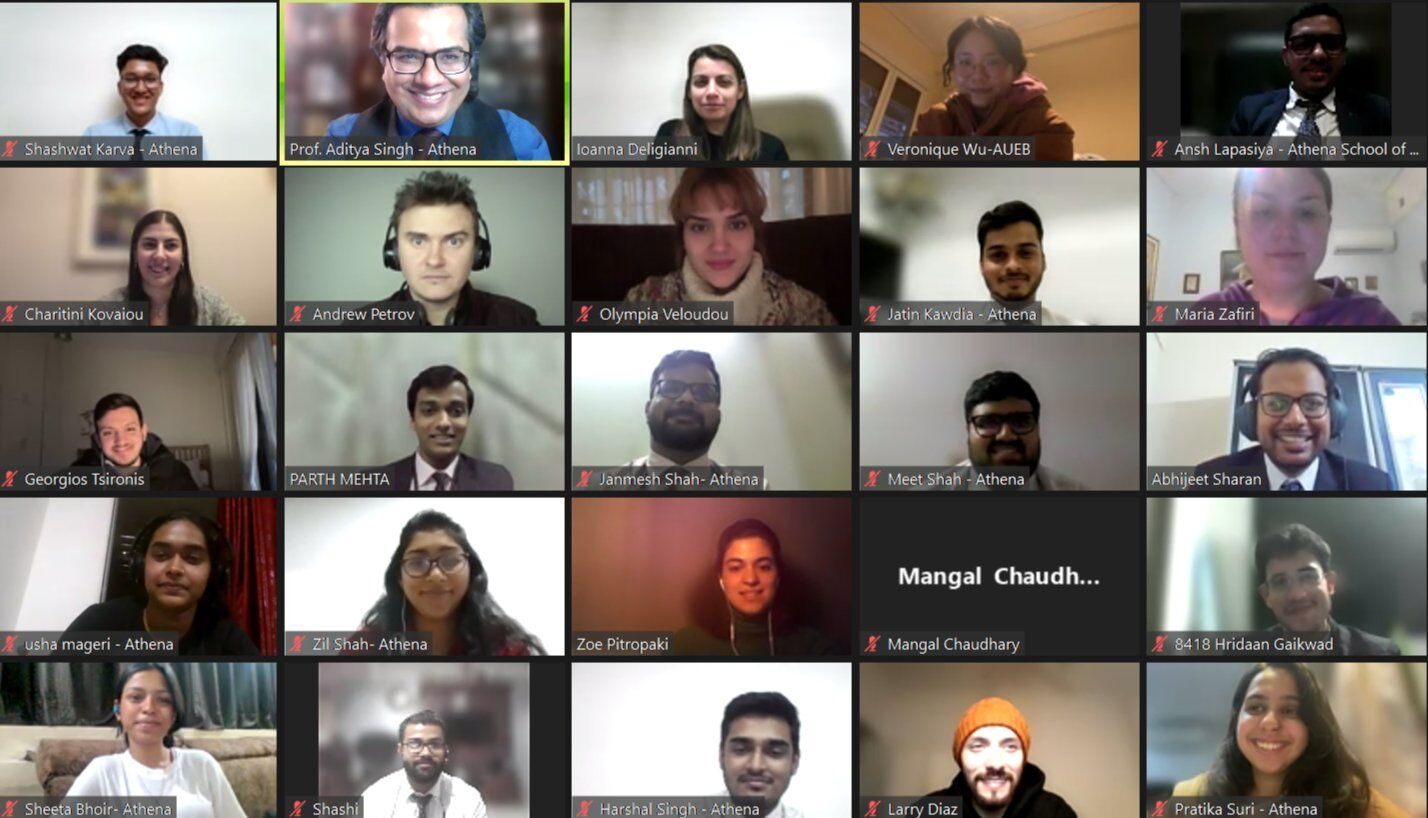
10Q. As the Chair of the ESG Central of Excellence, how do you foresee the integration of sustainability and responsible business practices into the curriculum at Athena School of Management?
Ans: ESG investment is integral to our educational approach at Athena School of Management. In fact, I’m also part of the committee for PRME (Principles for Responsible Management Education) in India. ESG isn’t an external, third-party consideration; it’s a vital business imperative.
This perspective is woven into every aspect of our curriculum. Sustainability and the UN Sustainable Development Goals (SDGs) hold a significant place in our educational mission. We emphasise the importance of preserving our planet, as there is no “Planet B.” This approach ensures that every student comprehends the significance of ESG. Moreover, with the emergence of Scope 2 & 3 emissions in the industry, we prepare our students to be well-equipped for future roles in global companies. Additionally, our global network and association with institutions like the AG Center in Switzerland provide us with valuable insights and access to industry research on a global scale. This connection further enriches our understanding of the evolving landscape of responsible business practices.
11Q. Could you share your vision for Athena School of Management in the coming decade?
Ans: Athena’s vision is rooted in our global identity. In the coming decade, we aim to be significant players on the global stage, not necessarily in terms of size but through the impact we create. To achieve this, we’ve already taken steps like launching global programmes such as the Master’s in Global Luxury and Brand Management. We are also looking at expanding our physical presence across the world, whether as standalone campuses or points of access for Indian students to gain international exposure. These campuses will develop their ecosystems and contribute to our overall mission. The initial decade was about laying a robust structural foundation, much like the work of a civil engineer. Now, in this decade, we’re focused on constructing a tall and impressive skyscraper at a rapid pace.
12Q. Given your global perspective, is there a focus on attracting international students to India?
Ans: We have always been fortunate to attract international students, even at a very early stage. We have students from Nepal, the Middle East, Madagascar, and all over the world studying at Athena. We are also very lucky to have both short-term and long-term programmes. I think India is today where China was in 1994-1995 when students from all over the world came to China to explore their businesses. Today, many top Indian universities have a lot of international students. I think we are now going to enter that stage. The problem is, are Indian schools themselves looking at that? Many Indian schools are very insular and inward-looking. They do not look out to the world. If you do not give out a welcoming hand, why would people come to you? That is what we are doing at Athena. We give a warm welcome to all students, regardless of their nationality. We want to exchange our views and knowledge with them and learn from them as well.
13Q. If you were to offer recommendations to Indian business schools, what steps would you suggest to enhance India’s recognition as a destination for MBA degrees?
Ans: To begin with, it’s crucial to shed the “inferiority complex” that often prevails in India. We are in an era where India’s potential is on the rise, with a massive population and a growing economy. We need to recognise and engage with the world as equals rather than seeking help or favour.
Secondly, our approach to international relations should be based on a quid pro quo mindset—what can we offer, and what can we gain? It’s essential to transition from an emotionally driven culture to a more pragmatic one. As Henry Kissinger wisely stated, in the international arena, there are no friends, only permanent interests. Leveraging these interests can position India as a destination for the world. Currently, our focus is primarily on inviting international universities into India, but I envision a shift towards attracting international students to our country. This transformation would be a significant step forward in the global education landscape.
14Q. What are the top few factors that students should keep in mind when considering an MBA?
Ans: The ultimate goal is not just about the money you earn; it’s the end product of various factors. When considering an MBA course, it’s crucial to find a school that fits you and your goals. Every student has a good school that suits them, and every school has a student who’s the right fit. Understand what you aim to achieve with your MBA. Do you want a degree, a great experience, a successful corporate career, or to become a leader? Consider whether a brand name, an immersive experience, or exposure to a global canvas is more important to you. Equally critical is the level of care and involvement the institution provides. Do they genuinely care about your growth as a student? It’s essential to think long-term; an MBA is not a sprint but a marathon. Consider where you want to be 10 years after completing your MBA and how the school will support you on that journey. Expect highs and lows in your career. An institution’s role is not just to make students feel great when things are going well but to ensure that, as professionals, they never look back. When challenges arise, they have the resilience to overcome them.
15Q. In light of the substantial demand for sustainable business leaders, what steps can MBA students take to equip themselves for a lasting impact beyond their academic pursuits?
Ans: First and foremost, self-belief is crucial. You can’t simply conform to the norm; you must have faith in your own convictions. It’s easier said than done, but it’s vital. Secondly, identify the areas where you can make an impact. Not everyone is an Einstein or a Newton, and that’s perfectly fine. Understand where you want to create change and how far you’re willing to go on that journey. Sacrifice is often the price of greatness, so be prepared to put in the effort. As you move forward, keep in mind the saying by Johnny Walker, “The path always clears for the person who knows where they are going.” Knowing your destination and taking action will pave the way.
Regarding success, it’s a personal measure. It’s about waking up every morning excited about what you’re doing and loving your work so much that you never dread going to the office. Success is when you can create a meaningful impact on the lives of those around you. It’s about sitting in your drawing room, putting your feet up, and reflecting on your day with a smile, knowing you’ve achieved something special. Success is experiencing joy in life and love, and it’s about being a global citizen and drawing inspiration from diverse experiences gained through global travel.
16Q. What qualities do you consider ideal in a candidate? What attributes would you prefer to see in candidates applying to foster an ethical environment?
Ans: I consider several key factors when evaluating candidates. Firstly, I value non-conformists – individuals who’ve ventured into uncharted territories, whether in co-curricular activities, social work, or their careers. Being different and standing apart from the crowd is an attribute I highly regard.
Secondly, passion is vital. A deep-seated drive for success is essential because it fuels sustained effort. Without it, burnout becomes a real risk.
Thirdly, a positive attitude is paramount. Academic brilliance alone doesn’t cut it. I’ve encountered brilliant minds with no energy or enthusiasm. We seek individuals who not only excel academically but also exhibit a positive outlook on life. To be clear, your class 12 score doesn’t carry overwhelming importance for us. What matters more is your academic aptitude and, more importantly, your broader accomplishments and aspirations. In essence, I care less about who you are today than about who you aspire to become tomorrow. That’s the focus of our evaluation.
17Q. Can you describe the MBA in 10 words?
Ans: When I think of an Athena MBA, I envision a remarkable journey. It’s not about what you believe you can be; it’s about striving to be the best you can possibly be, no exceptions. It’s a quest for actualising your potential, not just pondering your capabilities. In the end, it’s not about what you think you can achieve; it’s about what you truly accomplish.
At the intersection of education, innovation, and global impact, Aditya Singh’s journey is a testament to the transformative potential of the MBA world and its profound influence on the broader business landscape. In this interview, we’ve explored the dynamic synergy between academia and real-world practice, highlighting the critical role MBA programmes play in shaping future leaders and addressing pressing global challenges.
As we conclude, Aditya’s commitment to sustainability, innovation, and development goals serves as a powerful reminder of the positive change that can be achieved when education aligns with the needs of our ever-evolving world. Aditya Singh’s unique perspective offers a compelling vision for the future of MBA education and its vital place in driving progress and prosperity on a global scale. His remarkable perspective offers not just a glimpse but a compelling vision of the future of MBA education. It underscores the pivotal role it plays in advancing progress and prosperity on a global scale, leaving an indelible mark on the business world.
Admissions are open for Athena School of Management Batch 2024–26: APPLY NOW
Thank you, dear readers, for your incredible support and enthusiasm for this interview. We’re thrilled to have you engaged on PG, and there’s more exciting content coming your way. Be sure to stay active on our platform for more captivating reads, and don’t forget to check out our recent articles here. Happy reading!
